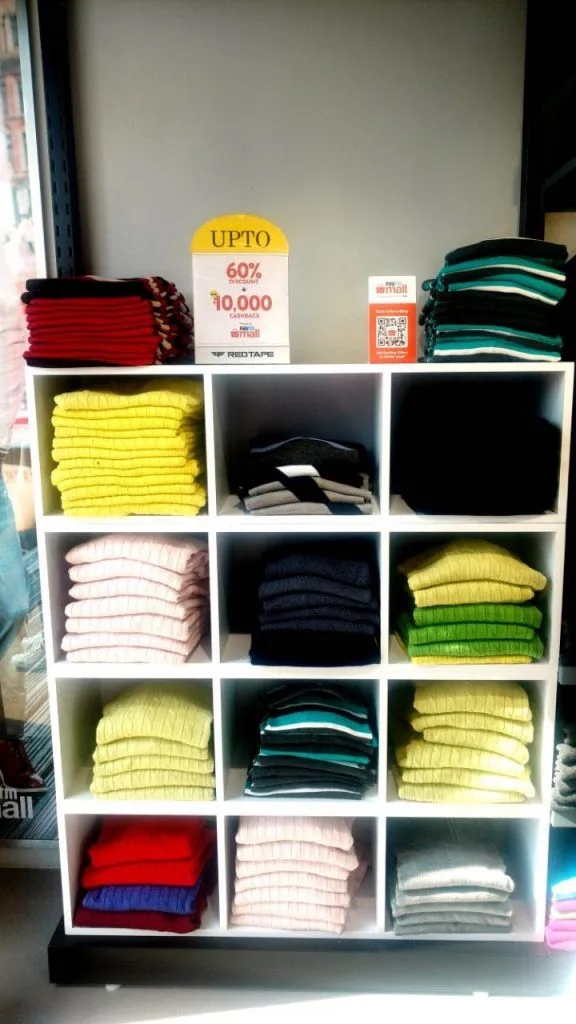Your shopping will get easier now: Paytm Mall introduces Alibaba’s New Retail model in India
Partnering with fashion brand RedTape, Paytm Mall is targeting Rs 500 crore from this model this year.

Aiming to merge online and offline shopping experience seamlessly, e-commerce platform Paytm Mall has taken a leaf out of its investor China-based Alibaba’s book — its famed New Retail model. The Gurugram-based e-commerce arm of financial services platform Paytm has tied up with fashion brand Red Tape in this regard.
Through this service, all the products in RedTape physical stores are equipped with Paytm Mall QR codes, and the app will tell the customer details about the product by scanning the code. The customer can place the order instantly, and get it delivered at home in four to six hours through Paytm Mall’s courier partners, or pick up from the store itself.
Currently Paytm Mall has tied up with Red Tape across 50 stores across tier 1, tier 2 and tier 3 cities such as Delhi, Kolkata, and Kanpur, for Red Tape, and will reach 150 stores by the end of this year.
In a press release, Amit Sinha, COO, Paytm Mall, said, “We will also offer this technology to traditional retailers to help them transform into the digital age. We are confident this will prove beneficial for brands as it combines offline stores, warehouse and fulfillment hubs into a single place thereby enabling them to offer an enhanced experience to shoppers.”
New retail model
Alibaba launched New Retail model during the Double 11 sale in 2017, the ninth edition of their biggest sale, conducted on November 11. Empowered by Alibaba’s technology, around 100,000 retail stores in China were converted into 'smart stores' with features such as facial recognition payment and scan-and-deliver O2O shopping.
Alibaba has also launched this model in the grocery segment with ‘Hema’, where the customer can scan the products using the app’s scan QR code and delivered it at home or picked up from the store.
Talking to YourStory about the initiative, Amit said that this is a unique implementation of Alibaba’s New Retail model — tailored for India, and hence the partnership with RedTape, an Indian brand. According to him, they are a forward looking brand, clear of what their retail experience should evolve into. “RedTape has well-controlled presence in retail stores, as customer experience is very important for them. Whether is it multi brand, third party retail store or their own outlets, RedTape is very well aligned to what we plan to do; hence, the quick implementation,” he says.

Better efficiency
Paytm Mall aims to maximise partnered brands’ reach and increase the overall efficiency of the retail ecosystem by combining three places: stores, warehouse and fulfillment hub into one place. This will ensure brand authorised retailers don’t have to block a lot of capital in inventory, while offering customers much greater choice.
Amit explains, “Once the customer is registered at the store, we can send them offers based on their purchasing patterns regarding their style, favourite brands, etc., which in turn increases the reach for the store also. The whole store is empowered by our tech. We will soon sign up with multi-brand stores also.”
Fashion is the first step
Paytm Mall is expecting Rs 500 crore with RedTape by the end of 2018. This will be seven to eight percent of their GMV target of $10 billion for FY2019.
After fashion, Paytm Mall will focus on large appliances category of which, Amit says, only seven to eight percent is online market share. “Compared to mobile phones, online exposure is low for large appliances and laptops. Inventory holding is hard for this category. After scanning you can select the number SKUs, size, etc., and you can book the order on the app itself.”
At Redtape stores, their entire catalogue is enabled by QR Code. When you scan it for details, the information provided to the consumer is standardised and of great quality, and includes videos explaining unique features. Amit believes that this gives richer customer experience.
With Alibaba making its grip stronger in India, this move shows how India can benefit from the e-tail giant’s business model. Since Paytm in 2013, the Chinese retail giant has been making investments in India, with online grocer Bigbasket and logistics firm Xpress Bees being the latest ones.
Earlier, when asked if he thinks India has the potential to adapt to this New Retail model, Alibaba CEO Daniel Zhang had said, “India has great opportunity for New Retail to take off. In some countries, e-commerce may not take the traditional route. They skip a phase just like some markets skipped PC/desktop to go to mobile. In those markets, e-commerce 1.0 is skipped and it goes directly to e-commerce 2.0. But this depends on technology, data, and innovation in retail formats.” He has added that Paytm Mall’s O2O model was definitely a precondition for New Retail.







